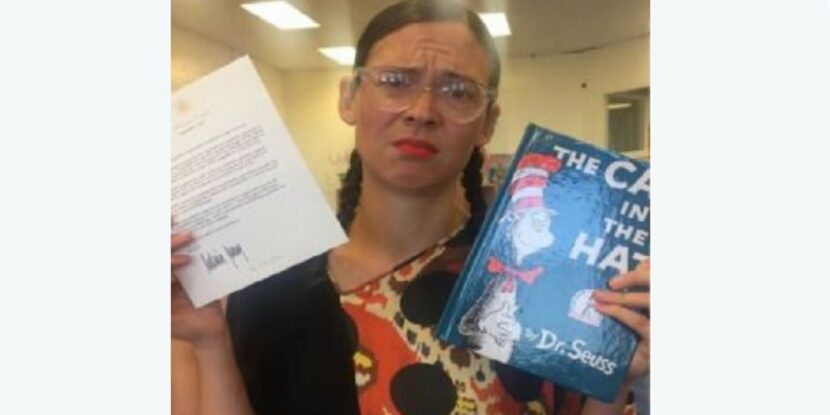Last week, an obscure school librarian from an obscure elementary school in Cambridge, Mass., took a calculated risk that, in hindsight, is really better described as a miscalculated risk. Liz Phipps Soeiro decided to play politics at the expense of the pre-K through 5th grade students at the school where she is employed.
Leading up to the fateful day, First Lady Melania Trump sent a gift of books to one school in every state to celebrate National Read a Book Day. The schools were selected based on their high standards of excellence in English/Language Arts, and the gift contained ten books from the works of Dr. Seuss. Forty-nine other librarians graciously accepted the gift to share with the emerging and early fluent readers who use their libraries.
And then there’s Cambridgeport Elementary School and the rancorous Soeiro, who is apparently of the belief that children shouldn’t read Dr. Seuss for a whole host of reasons. Rather than graciously accepting the gift and carrying on with her obscure job in her obscure elementary school, she sent them back. She rejected them. And not quietly or with decorum. She rejected them in the form of an open letter to Mrs. Trump that she posted on the internet.
(Bad idea, my dear. Bad idea.)
Social media has sufficiently skewered Soeiro for her condescending and politically motivated response to Mrs. Trump’s gift — the rant is full of progressive buzzwords such as “systemic white supremacy,” “racist propaganda,” and “oppression.” It was not a gracious declination, and the internet let her know it in no uncertain terms. Soeiro has since deactivated her Twitter account, @ReflectLibrary, and her blog, reflectivelibrary.blogspot, has been removed.
While Soeiro may be a wiz at alphabetizing by author, she is clearly not an expert in early childhood literacy. Frankly, neither am I. But I was taught to read as a child and used those same tools to teach my daughter to read, as well. Suffice it to say, activism played no part.
As Soeiro laments her school’s persistent achievement gap, perhaps she should consider cracking open Green Eggs and Ham, and reading to her students. Studies have shown that listening to the cadence of Dr. Seuss stories actually helps kids learn to read. Repetition, rhythm and rhyme, the three Rs of literacy, are necessary ingredients that help children process the speech they hear and fine-tune the connections between auditory and language networks in the brain.
Repetition in the lyrical works of children’s literature promotes language development. It is a building block of literacy and is an essential element of a child’s first sentences. Patterns found in The Cat in the Hat or I Can Read With My Eyes Shut improve cognitive function by bolstering recall and memorization. It also fosters sequencing — long understood to improve early math skills. Repetition teaches children how to make predictions about rhymes and rhyming phrases which instills a positive attitude toward books and the experience of reading. Such whimsical and playful language is beneficial to the development of a sense of humor, improves the ability to identify emotions and encourage empathy toward others, and establishes the foundation for imagination and creativity.
Kay Vandergrift, former Professor Emerita of Children’s Literature at Rutgers University, said rhyming was “…good for a child’s brain.” She continued, “Not only does the repetition of rhymes and stories teach children how language works, it also builds memory capabilities that can be applied to all sorts of activities.” Rhyming is often a child’s first experience with literacy, and the emphasis on the melody and rhythm increase a child’s vocabulary and verbal skills.
Stories that contain the three Rs of literacy improve a child’s phonetic awareness, an excellent indicator of later reading success. They are the foundational reading skills that strongly predict conventional literacy skills and, hopefully, encourage a lifelong love of reading.
But establishing a lifelong love of reading wasn’t Soeiro’s goal. She should have risen above identity politics, and yet she prefered to polarize. She chose 15 minutes of internet fame — a tough gig, as she has obviously discovered — rather than sowing seeds of literacy. Soeiro made it abundantly clear that not only is her role at the school based on social justice, but that the school culture is deeply entrenched in activism.
Repetition, rhythm, and rhyme are clearly of little consequence when the school library is stocked with agenda-driven books like Gay and Lesbian History for Kids: The Century-Long Struggle for LGBT Rights, with 21 Activities, by Jerome Pohlem, and Who Are You?: The Kid’s Guide to Gender Identity, by Brook Pessin-Whedbee. Or when the Soeiro-created “Coffee & Conversation” discussion group hosts a board member of CAIR. Or when the K-2 library lesson of the day is boycotts, marches, protests, and privileges. (All information collected from the @Cport_Specialists Twitter account.)
Liz Phipps Soeiro is government education. Liz Phipps Soeiro is why the school choice movement she laments in her lengthy criticism has taken root and is expanding across the country. Liz Phipps Soeiro is why the number of K-12 homeschooled students increased by 62 percent between 2003 and 2012. Parents want their children educated, not indoctrinated. They want their children taught facts, not emotion-laden opinions.
Soeiro’s open letter was a sobering reminder why government education has failed. Right about now, she’s probably wishing she had simply sent a thank you note.
Photo credit: Screenshot via Twitter


